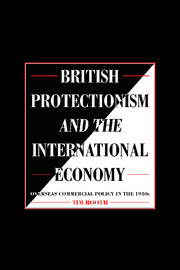Book contents
- Frontmatter
- Contents
- Preface
- List of Tables
- Introduction
- 1 Britain's international economic position in the 1920s
- 2 The political economy of protectionism
- 3 Imperial preference and the Ottawa Conference
- 4 The Scandinavian negotiations: formulation of policy
- 5 Completion of the first phase of negotiations: Scandinavia, Germany and Argentina
- 6 The world economic conference, Finland and Japanese competition
- 7 The Baltic states and Poland
- 8 British agricultural policy and imports during the 1930s
- 9 British exports to the trade agreement countries
- 10 Appeasing Germany and the United States
- 11 Some general conclusions
- Appendix A United Kingdom: payments, clearing etc., Agreements in force 1931–1938
- Appendix B Miscellaneous trade and payments agreements
- Appendix C Imports into Britain from foreign agreement countries
- Appendix D Total exports from Britain to foreign agreement countries and four dominions
- Appendix E Imports of selected commodities into UK, 1931, 1937, showing percentage from Empire sources
- Bibliography
- Index
3 - Imperial preference and the Ottawa Conference
Published online by Cambridge University Press: 06 July 2010
- Frontmatter
- Contents
- Preface
- List of Tables
- Introduction
- 1 Britain's international economic position in the 1920s
- 2 The political economy of protectionism
- 3 Imperial preference and the Ottawa Conference
- 4 The Scandinavian negotiations: formulation of policy
- 5 Completion of the first phase of negotiations: Scandinavia, Germany and Argentina
- 6 The world economic conference, Finland and Japanese competition
- 7 The Baltic states and Poland
- 8 British agricultural policy and imports during the 1930s
- 9 British exports to the trade agreement countries
- 10 Appeasing Germany and the United States
- 11 Some general conclusions
- Appendix A United Kingdom: payments, clearing etc., Agreements in force 1931–1938
- Appendix B Miscellaneous trade and payments agreements
- Appendix C Imports into Britain from foreign agreement countries
- Appendix D Total exports from Britain to foreign agreement countries and four dominions
- Appendix E Imports of selected commodities into UK, 1931, 1937, showing percentage from Empire sources
- Bibliography
- Index
Summary
Almost invariably demands for protection had been accompanied by calls for closer imperial integration. For some this was vital for the maintenance of Britain's world standing: political, diplomatic and even military status was enhanced by Britain's position at the head of a united commonwealth. Each move to greater autonomy for the self-governing dominions shaded London's authority. Although in 1931 the Statute of Westminster only gave formal expression to a reality that had been clear for some years, it nonetheless could be regarded as a climax to the process of political independence for the white dominions. Writing at the beginning of 1932, Sir Robert Vansittart, head of the Foreign Office, had suggested:
one reason for our loss of weight since 1926 has been that the ‘foreigner’ – we must be insular for a minute – has been secretly anticipating the gradual dissolution of the Empire, and some of the Commonwealth delegations have not at times exactly discouraged the idea. It is therefore essential that this hand should be played with the greatest possible measure of unity among the Commonwealth representatives… it is impossible to separate ourselves from, or to go against the Dominions at this crisis…
Imperial unity might be buttressed by closer ties, particularly in economic relations. Chamberlain later described the Ottawa agreements as ‘an attempt to bring the Empire together again and to supplement and support the common sentiment by bringing more material interests into line with it ’.
- Type
- Chapter
- Information
- British Protectionism and the International EconomyOverseas Commercial Policy in the 1930s, pp. 71 - 100Publisher: Cambridge University PressPrint publication year: 1993



